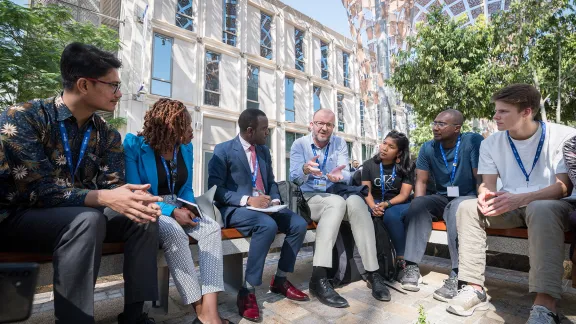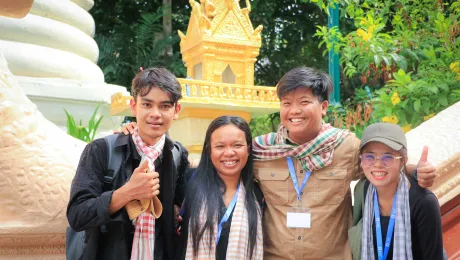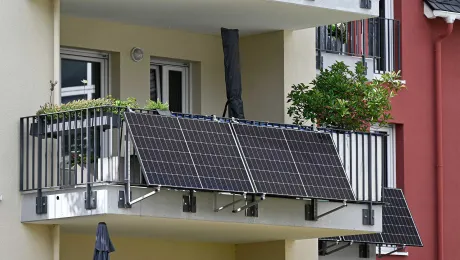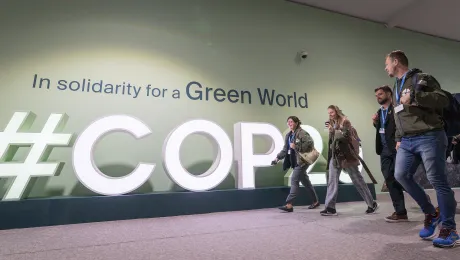Young LWF delegates to COP28 in Dubai are calling for decision-makers to listen to the voices of those most affected by the climate crisis

LWF delegates pictured at the United Nations climate summit COP28 in Dubai, United Arab Emirates. Photo: LWF/Albin Hillert
Faith based organizations have a role in promoting climate justice
(LWI) - “When it comes to climate change, it is really necessary to listen to all generations and all cultures and all countries.” Ole Andreas Grøtte Børnes, a young Lutheran World Federation (LWF) delegate to the COP28 summit in Dubai, spoke at a side event on 5 December, stressing the importance of teamwork in the struggle to slow down global warming and protect planet Earth.
Børnes, who comes from the Church of Norway was among the panelists in a discussion entitled ‘From policy to practice: ethical considerations and human rights implications for loss and damage funding arrangements. Altogether, over 60 LWF representatives are taking part in the United Nations climate summit this year, participating both in person at the Expo City venue in Dubai and online.
During the event, which included the participation of Ramon Pichs, Vice Chair of the Intergovernmental Panel on Climate Change (IPCC), Børnes warned against practices of ‘greenwashing’ which fail to take seriously the urgency of the global climate crisis. He noted that “the money for loss and damage must be new and additional, not taken from other parts of a country’s budget such as development aid or climate budgets for adaptation or mitigation”. He urged governments to take non-economic losses and damages into consideration as well. Governments agreed at the COP27 summit in Egypt to establish a fund to address the needs and priorities of those affected by climate-related loss and damage.
Changing attitudes, building resilience
The young Norwegian delegate also underlined the importance of faith communities encouraging congregations and individuals to play their part in protecting the environment, “from recycling plastics to changing from diesel to electric cars or campaigning to urge politicians to stop oil and coal extraction.” Each engagement, he said, is “like planting small seeds of love,” and he noted that climate justice work “is like a football team where everyone’s different skills are needed.”
During another side event at the start of the two-week summit, Sandra Ombese from the Kenya Evangelical Lutheran Church spoke about her work in the African context as part of a debate on the contribution of faith-based organizations to building climate resilience and adaptation. She shared details of a project called ‘Plant Trees, Save Earth’ which has been successful in raising awareness, protecting the environment and bringing many young people on board.
A similar initiative, begun by another LWF climate activist in Kenya, Maua Maro, has been promoting beach clean-ups to highlight the damage that plastics and other pollutants are doing to the seas and oceans. Ombese noted how projects like these can empower youth “to understand the threats to their communities and ecosystems,” leading to a change in attitudes and “long-lasting adaptation benefits.”
Indigenous wisdom, environmental solutions
Speaking from a Latin American perspective, Carine Josiéle Wendland from Brazil took part in an interfaith youth dialogue on climate justice, highlighting the effects of the environmental crisis on the indigenous Guarani people in her country. Taking part in a panel during the COP28 Faith Pavilion’s opening day, she urged decision-makers to “reverse the logic, so that the South, in addition to suffering the consequences of climate change, can be a place for solutions too.”
Rev. Haposan Cornelius Sinaga from the Protestant Christian Batak Church (HKBP) in Indonesia reminded COP delegates of the wisdom of his ancestors, who “lived harmoniously with nature” in North Sumatra for centuries. Noting the anthropocentric perspectives brought by Christian missionaries to the region, he said faith groups “need to review theological documents that seem anthropomorphic and discriminatory towards nature,” highlighting instead “scriptural texts and teachings that promote justice and peace.”
Over 70.000 participants from around the globe are taking part in COP28 which faces the crucial task of keeping alive the goal of limiting the rise in global temperatures to 1.5°C in order to avoid the most damaging impacts of climate change. The U.N. has warned that the window for keeping that limit within reach is “rapidly narrowing.”
The LWF participates in the 28th UN Climate Change Conference (COP28), which takes place in Dubai, United Arab Emirates, from 30 Nov - 12 Dec 2023. This engagement is part of the communion’s ongoing focus on strengthening climate action and advocacy at all levels. Young people are vital agents of change and form a greater part of the LWF’s delegation to COP28.


